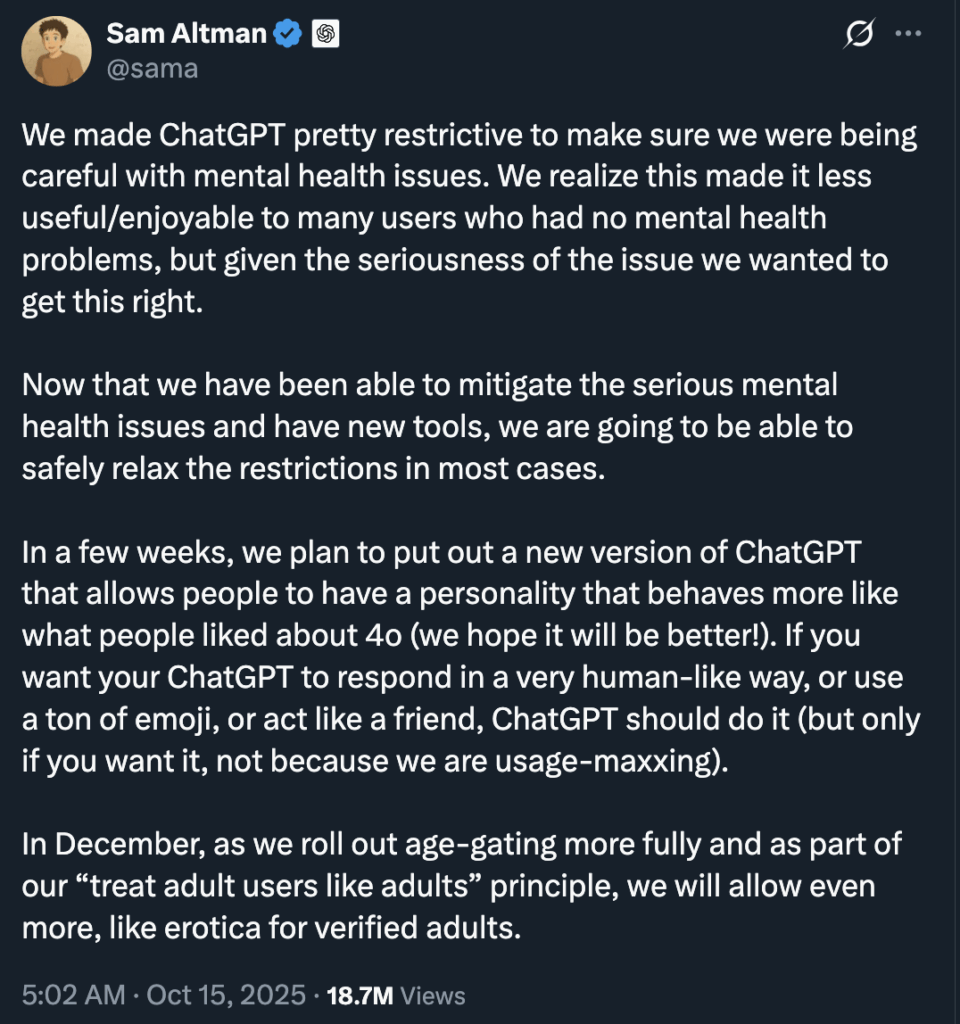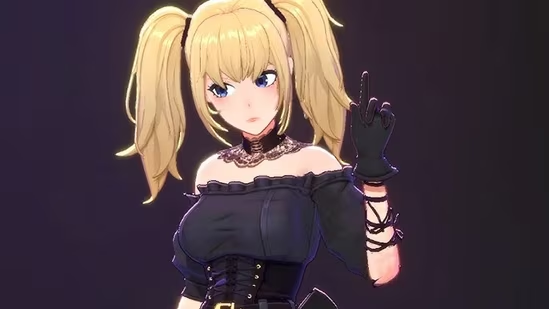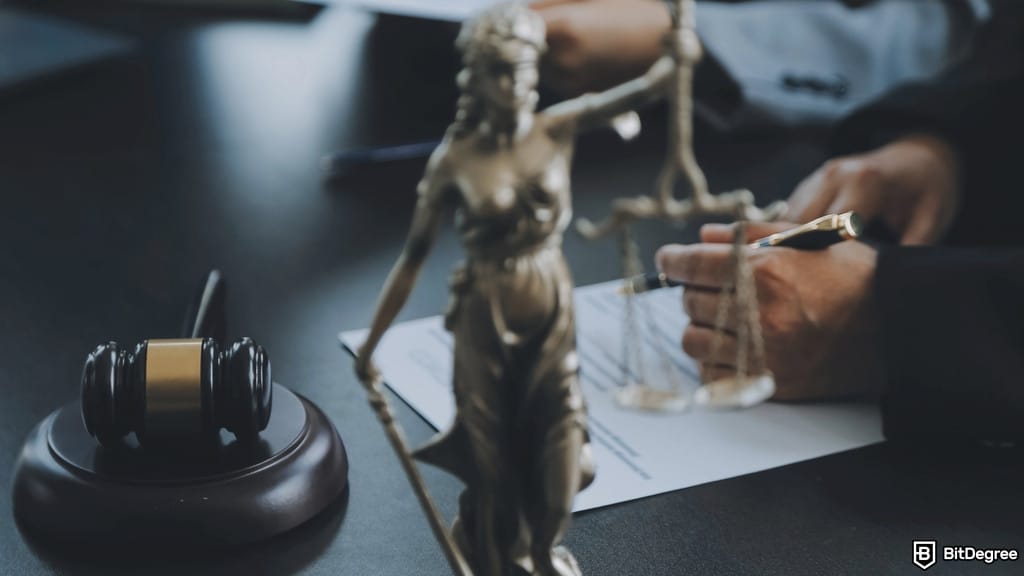
The Rise of the Digital Friend
What began as harmless chat apps have evolved into emotional prosthetics. Teenagers, growing up in a fractured social landscape, are increasingly turning to AI companions for connection, support, and even affection. Surveys show that nearly three-quarters of teens have interacted with an AI chatbot, and a third admit to using them as confidants or for emotional comfort.
The numbers are staggering but not surprising. AI companions aren’t passive question-answering machines — they remember, empathize, and simulate affection. That’s the draw. Conversations can feel authentic, even intimate. For many young users, AI friends are less judgmental than parents or peers.
But as these systems get more human-like, the line between harmless escapism and emotional manipulation blurs fast.

In December, Open Ai will roll out age-gating and as part of its “treat adult users like adults” principle, will allow erotica for verified adults, Source: X
A Law Born from Tragedy
The GUARD Act — short for “Guard Against Unsafe AI for the Rights of our Daughters and Sons” — is a direct response to mounting reports of minors forming intense emotional bonds with chatbots, sometimes with tragic consequences. High-profile lawsuits have accused AI companies of negligence after teens who discussed suicide with chatbots later took their own lives.
Under the bill, AI systems that simulate friendship or emotional intimacy would be banned for anyone under 18. Chatbots would be required to clearly and repeatedly identify themselves as non-human. And if an AI product aimed at minors ever generates sexual content or encourages self-harm, the company could face criminal prosecution.
It’s a hard pivot for an industry that has thrived on “move fast and break things.”

Ani, Grok’s female companion, source: X
Big Tech’s Defensive Shuffle
Sensing the regulatory hammer coming down, AI companies are scrambling to clean house — or at least look like they are.
OpenAI, whose ChatGPT has become the de facto AI therapist for millions, recently disclosed an uncomfortable truth: roughly 1.2 million users discuss suicide each week with its models. In response, the company formed an Expert Council on Well-Being and AI, composed of psychologists, ethicists, and nonprofit leaders. It’s also testing built-in crisis detection that can nudge users toward mental health resources in real time.
But OpenAI’s challenge is structural. ChatGPT was never built to handle trauma, yet it’s now functioning as a first responder for millions in distress. The company’s leadership insists it doesn’t want to be “the world’s therapist,” but that’s what’s happening anyway — because there’s a vacuum no one else is filling.
Character.AI, the startup famous for creating customizable AI personalities — from anime girlfriends to AI mentors — has taken the most drastic action so far. Facing lawsuits and public outrage, it quietly banned all users under 18 and began rolling out stricter ID verification. The move came after reports that minors were engaging in explicit chats with the platform’s characters. Character.AI insists it’s not a dating or mental health app, but the blurred use cases say otherwise.
Meanwhile, Meta is trying to contain its own AI romance problem. After reports that its “Meta AI” and celebrity-based chatbots were engaging in flirty or suggestive exchanges with underage users, the company implemented what insiders describe as an “emotion dampener” — a re-tuning of the underlying language model to avoid emotionally charged language with young accounts. It’s also testing “AI parental supervision” tools, letting parents view when and how teens interact with the company’s chatbots across Instagram and Messenger.
The Age-Gating Arms Race
All of this has triggered a new front in the AI wars: age verification. The GUARD Act would force companies to implement robust systems for verifying user age — government IDs, facial recognition, or trusted third-party tools.
That’s where the privacy nightmare begins. Critics argue this could create new data risks, as minors would effectively have to upload identity data to the same platforms lawmakers are trying to protect them from. But there’s no way around it — AI models can’t “sense” age; they can only gatekeep by credentials.
Some AI companies are exploring subtler approaches, like “behavioral gating,” where systems infer age ranges from conversational patterns. The risk? Those models will make mistakes — a precocious 12-year-old could be mistaken for a college student, or vice versa.
A Cultural Shift, Not Just a Tech Problem
The GUARD Act is more than just child protection — it’s a referendum on what kind of society we want to live in.
AI companions didn’t appear in a vacuum. They thrive because we’ve built a generation fluent in loneliness — connected digitally, but emotionally malnourished. If teens are finding meaning in conversations with algorithms, the problem isn’t only the code; it’s the culture that left them searching there.
So yes, AI needs regulation. But banning digital companionship without fixing the human deficit underneath is like outlawing painkillers without addressing why everyone’s in pain.
The Coming Reckoning
The GUARD Act is likely to pass in some form — there’s bipartisan appetite and moral panic behind it. But its impact will ripple far beyond child safety. It will define what emotional AI is allowed to be in the Western world.
If America draws a hard line, companies may pivot to adult-only intimacy platforms or push development offshore, where regulations are looser. Europe, meanwhile, is moving toward a “human rights” framework for emotional AI, emphasizing consent and transparency over outright prohibition.
What’s clear is this: The era of unregulated AI intimacy is over. The bots are getting too human, and the humans too attached. Lawmakers are waking up late to a truth the tech industry has long understood — emotional AI isn’t a novelty. It’s a revolution in how people relate. And revolutions, as always, get messy before they get civilized.


























 24h Most Popular
24h Most Popular







 Utilities
Utilities